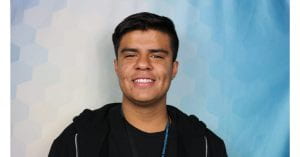
Mi Identidad: Caught in the Middle
My mother had no clue of what it meant to obtain a quality education when she immigrated to the United States from her hometown of Atemajac De Brizuela with her single mother 44 years ago. Growing up in Oakland, California and not speaking a word of English, my mother was taught that the only way to survive in this country was with hard work. She was forced to drop out of her post-secondary education to work longer hours and care for her three younger sisters. Every day, my mother works to give my sister and me what she never had. From her, I have learned to never take anything for granted; when opportunities come around, I commit myself to chasing them until I have achieved success.
When I was seven years old, my family moved to a town where my parents believed my sister and I would receive the best public school education. When we first arrived, I was one of the few Latinos in my elementary school. This made it extremely difficult to make friends and I was now one year behind in the curriculum. I spent countless hours after school and on weekends working my hardest to merely catch up with the rest of my classmates. This experience helped instill in me the determination I carry with me today. Growing up in a middle class suburban neighborhood, I was one of the very few Latinos in my school. For a large part of my childhood, it was difficult for me to relate to other students because of my heritage. There were instances where I wished I was born a different skin color just to have the opportunity to feel accepted by my community.
As a 2nd generation Chicano, I can relate to the cultural self-identification conflicts Gloria Anzaldua mentions in “Borderlands.” The saying Anzaldua associates with the Chicano/a struggle, “A veces no soy nada ni nadie. Pero hasta cuando no lo soy, lo soy” translates to “Sometimes I’m nothing nor no one. But when I’m not, I am.” Chicanos/as have never felt a sense of unity or gained acceptance from their Mexican and Anglo-American cultures. It is because they have never shared the same values completely aligned with either culture. Being Chicano/a is a mixture of both cultures as well as one in of it’ own with the development of its own language, Chicano Spanish. I completely agree with Anzaldua’ statement that until a person accepts the legitimacy of their own language, they will not be able to accept the legitimacy of their own self and culture. She explains that, “Chicano Spanish sprang out of the Chicanos’ need to identify ourselves as a distinct people. We needed a language with which we could communicate with ourselves‚¶”(55). The integration of the Anglo-American and Mexican cultures has created a unique one that now represents the largest minority in the United States.
As the American political figure I look up to most, Robert F. Kennedy has inspired me to dedicate my life to serve my people and those without voice in today’ world. Two summers ago, I was visiting my father’ hometown, Techaluta de Montenegro, Jalisco, about two hours south of Guadalajara. There is a railroad that runs just outside of this town and for the first time I witnessed what I had only read about in articles and watched on the news. Central American immigrants who had ridden on top of the network of Mexican cargo trains referred to as “La Bestia”, or “The Beast,” were going house to house asking for donations or opportunities for work. My grandparents did not feel comfortable letting anyone they do not know into their home. Instead, they prepared food that the migrants can take on their journey. We were able to have a brief conversation with two Honduran immigrants in their early 20′. They explained to us the daily struggles of riding “La Bestia” from southern Mexico to the U.S. Mexico Border. Rodrigo Dominguez Villegas effectively describes these dangers in his article for the Migration Policy Institute, “Central American Migrants and ‘La Bestia.'” According to Villegas, “the dangers encountered on the journey through Mexico, whether on foot or on La Bestia, are many, including injury or death from unsafe travelling conditions, gang violence, sexual assault, extortion, kidnapping, and recruitment by organized crime,”(Central American Migrants and “La Bestia”). My encounter with the two Honduran migrants opened my eyes to the reality millions of migrants must live and attempt to escape. As someone who has had the privilege of being born a U.S. citizen, I have realized not to take the opportunities in this country for granted. I now feel it is a moral obligation of mine to give back to those less fortunate.
My mother came to this country in pursuit of the American Dream so she could provide her children with a better life than hers, so we could achieve dreams of our own. Through my hard work and dedication in pursuing a career in politics, I know I will be able to fulfill my purpose and jump to the highest limits to represent my family and my heritage.
